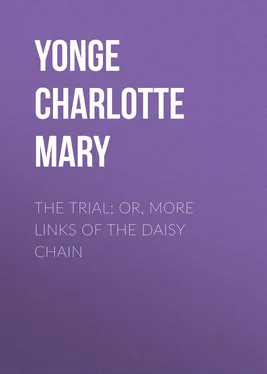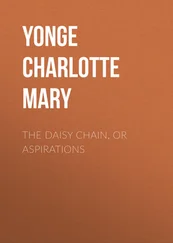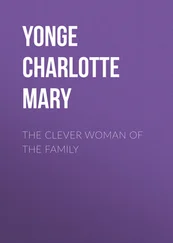Charlotte Yonge - The Trial; Or, More Links of the Daisy Chain
Здесь есть возможность читать онлайн «Charlotte Yonge - The Trial; Or, More Links of the Daisy Chain» — ознакомительный отрывок электронной книги совершенно бесплатно, а после прочтения отрывка купить полную версию. В некоторых случаях можно слушать аудио, скачать через торрент в формате fb2 и присутствует краткое содержание. Жанр: foreign_prose, literature_19, Европейская старинная литература, foreign_antique, на английском языке. Описание произведения, (предисловие) а так же отзывы посетителей доступны на портале библиотеки ЛибКат.
- Название:The Trial; Or, More Links of the Daisy Chain
- Автор:
- Жанр:
- Год:неизвестен
- ISBN:нет данных
- Рейтинг книги:4 / 5. Голосов: 1
-
Избранное:Добавить в избранное
- Отзывы:
-
Ваша оценка:
- 80
- 1
- 2
- 3
- 4
- 5
The Trial; Or, More Links of the Daisy Chain: краткое содержание, описание и аннотация
Предлагаем к чтению аннотацию, описание, краткое содержание или предисловие (зависит от того, что написал сам автор книги «The Trial; Or, More Links of the Daisy Chain»). Если вы не нашли необходимую информацию о книге — напишите в комментариях, мы постараемся отыскать её.
The Trial; Or, More Links of the Daisy Chain — читать онлайн ознакомительный отрывок
Ниже представлен текст книги, разбитый по страницам. Система сохранения места последней прочитанной страницы, позволяет с удобством читать онлайн бесплатно книгу «The Trial; Or, More Links of the Daisy Chain», без необходимости каждый раз заново искать на чём Вы остановились. Поставьте закладку, и сможете в любой момент перейти на страницу, на которой закончили чтение.
Интервал:
Закладка:
'Oh, yes, he will,' said Dr. May; 'he only wants stimulus to get on fast enough. I declare I'll ask Henry about it; I'm just going to meet him at the hospital.'
And before another word could be said, he let himself out at the back door of the garden, in which they had been meeting Richard, who was now allowed to come thus far, though both for Daisy's sake and his flock's, he had hitherto submitted to a rigorous quarantine; and the entire immunity of Cocksmoor from the malady was constantly adduced by each doctor as a convincing proof of his own theory.
'Well, I do hope that will go off!' exclaimed Ethel, as soon as her father was out of hearing. 'It will be a terrible upset to all one's peace and comfort with Aubrey!'
'Indeed—what harm will the poor boy do?' asked Richard.
'Make Aubrey into the mere shame-faced, sister-hating, commonplace creature that the collective boy thinks it due to himself to be in society,' said Ethel, 'and me from an enjoying sister, into an elderly, care-taking, despised spinster—a burden to myself and the boys.'
'But why, Ethel, can't you enjoy yourself!'
'My dear Richard, just imagine turning loose a lot of boys and girls, with no keeper, to enjoy themselves in some wild sea place! No, no: the only way to give the arrangement any shade of propriety, will be to be elderly, infuse as much vinegar as possible into my countenance, wear my spectacles, and walk at a staid pace up and down the parade, while my two sons disport themselves on the rocks.'
'If you really think it would not be proper,' said Richard, rather alarmed, 'I could run after my father.'
'Stuff, Richard; papa must have his way; and if it is to do the boy good, I can sacrifice a crab—I mean myself—not a crustacean. I am not going to be such a selfish wretch as to make objections.'
'But if it would not be the correct thing? Or could not you get some one to stay with you?'
'I can make it the correct thing. It is only to abstain from the fun I had hoped for. I meant to have been a girl, and now I must be a woman, that's all; and I dare say Aubrey will be the happier for it—boys always are.'
'If you don't like it, I wish you would let me speak to papa.'
'Richard, have you these five years been the safety-valve for my murmurs without knowing what they amount to?'
'I thought no one complained unless to get a thing remedied.'
'Exactly so. That is man! And experience never shows man that woman's growls relieve her soul, and that she dreads nothing more than their being acted on! All I wish is, that this scheme may die a natural death; but I should be miserable, and deserved to be so, if I raised a finger to hinder it. What, must you go? Rule Daisy's lines if she writes to Meta, please.'
'I did so. I have been trying to make her write straighter.'
'Of course you have. I expect I shall find her organ of order grown to a huge bump when she comes home. Oh! when will our poor remnants be once more a united family? and when shall I get into Cocksmoor school again?'
When Dr. May came home, his plan was in full bloom. Henry had gratefully accepted it, and answered for his brother being able to travel by the next Monday; and Dr. May wanted Ethel to walk with him to Bankside, and propose it there—talking it over with the sister, and making it her own invitation. Ethel saw her fate, and complied, her father talking eagerly all the way.
'You see, Ethel, it is quite as much for his spirits as his health that I wish it. He is just the age that our Norman was.'
That was the key to a great deal. Ethel knew that her father had never admitted any of the many excuses for the neglect of Norman's suffering for the three months after his mother's death; but though it thrilled her all over, she was not prepared to believe that any one, far less any Ward, could be of the same sensitive materials as Norman. To avoid answering, she went more than half-way, by saying, 'Don't you think I might ask those poor girls to come with him?'
'By no manner of means,' said the Doctor, stopping short. 'It is just what I want, to get him away from his sister. She minds nothing else; and if it were not for Mary, I don't know what the little ones would do; and as to Henry, he is very good and patient; but it is the way to prevent him from forming domestic tastes to have no mistress to his house. He will get into mischief, or marry, if she does not mind what she is about.'
'That must come to an end when Leonard is well, and goes back to school.'
'And that won't be till after the holidays. No, some break there must be. When he is gone, Mary can put her into the way of doing things; she is anxious to do right; and we shall see them do very well. But this poor boy—you know he has been always living at home, while the others were away; he was very fond of his mother, and the first coming out of his room was more than he could bear. I must have him taken from home till he is well again, and able to turn to other things.'
And before Ethel's eyes came a vision of poor Mrs. Ward leaning on her son's arm, on Saturday afternoon walks, each looking fond and proud of the other. She felt her own hardness of heart, and warmed to the desire of giving comfort.
Bankside was basking in summer sunshine, with small patches of shade round its young shrubs and trees, and a baking heat on the little porch.
The maid believed Miss Ward was in the garden. Mr. Leonard had been taken out to-day; and the Doctor moving on, they found themselves in the cool pretty drawing-room, rather overcrowded with furniture and decoration, fresh and tasteful, but too much of it, and a contrast to the Mays' mixture of the shabby and the curious, in the room that was so decidedly for use, and not for show.
What arrested the attention was, however, the very sweetest singing Ethel had ever heard. The song was low and sad, but so intensely sweet, that Dr. May held up his hand to silence all sound, and stood with restrained breath and moistened eyes. Ethel, far less sensitive to music, was nevertheless touched as she had never before been by sound; and the more, as she looked through the window and saw in the shade of a walnut-tree, a sofa, at the foot of which sat Averil Ward in her deep mourning, her back to the window, so that only her young figure and the braids of her fair hair were to be seen; and beyond, something prostrate, covered with wrappers. The sweet notes ended, Dr. May drew a deep sigh, wiped his spectacles, and went on; Ethel hung back, not to startle the invalid by the sight of a stranger; but as Averil rose, she saw him raising himself, with a brightening smile on his pale face, to hold out his hand to the Doctor. In another minute Averil had come to her, shaken hands, and seated herself where she could best command a view of her brother.
'I am glad to see him out of doors,' said Ethel.
'Henry was bent on it; but I think the air and the glare of everything is too much for him; he is so tired and oppressed.'
'I am sure he must like your singing,' said Ethel.
'It is almost the only thing that answers,' said Averil, her eyes wistfully turning to the sofa; 'he can't read, and doesn't like being read to.'
'It is very difficult to manage a boy's recovery,' said Ethel. 'They don't know how to be ill.'
'It is not that,' replied the sister, as if she fancied censure implied, 'but his spirits. Every new room he goes into seems to beat him down; and he lies and broods. If he could only talk!'
'I know that so well!' said Ethel. But to Averil the May troubles were of old date, involved in the mists of childhood. And Ethel seeing that her words were not taken as sympathy, continued, 'Do not the little girls amuse him?'
'Oh no! they are too much for him; and I am obliged to keep them in the nursery. Poor little things! I don't know what we should do if your sister Mary were not so kind.'
Читать дальшеИнтервал:
Закладка:
Похожие книги на «The Trial; Or, More Links of the Daisy Chain»
Представляем Вашему вниманию похожие книги на «The Trial; Or, More Links of the Daisy Chain» списком для выбора. Мы отобрали схожую по названию и смыслу литературу в надежде предоставить читателям больше вариантов отыскать новые, интересные, ещё непрочитанные произведения.
Обсуждение, отзывы о книге «The Trial; Or, More Links of the Daisy Chain» и просто собственные мнения читателей. Оставьте ваши комментарии, напишите, что Вы думаете о произведении, его смысле или главных героях. Укажите что конкретно понравилось, а что нет, и почему Вы так считаете.












